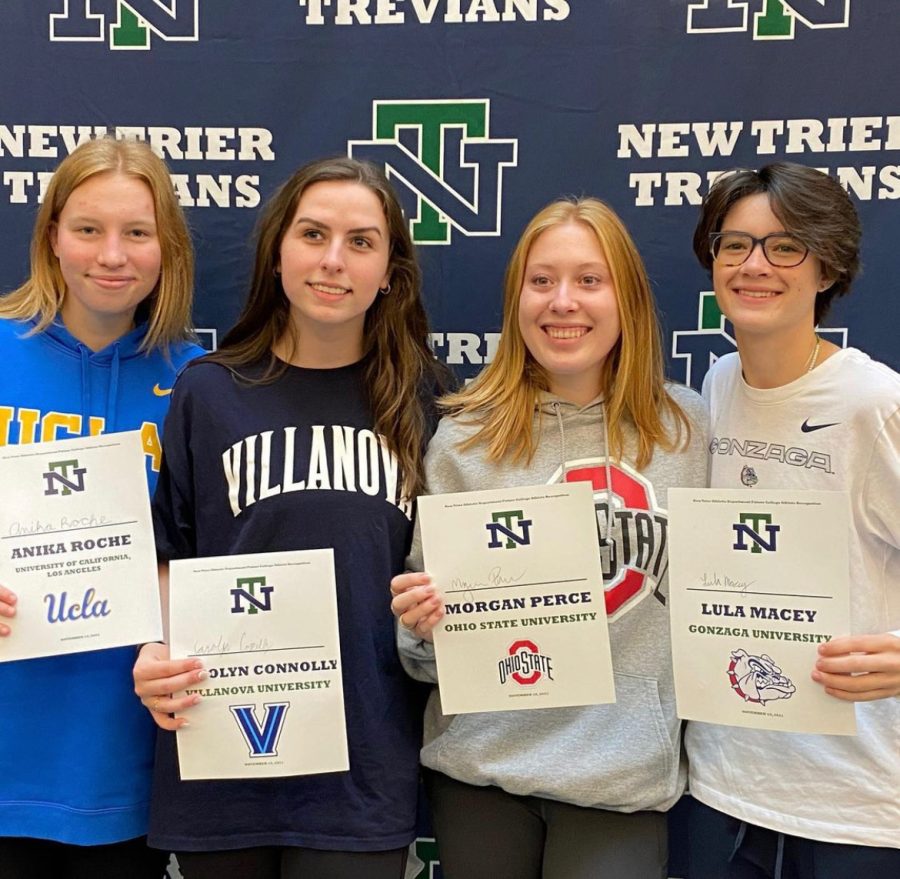Hours of erging leads to D1 commitments
Four Seniors sign letters of intent, commit to rowing at collegiate level
ntrcgirls Instagram
Anika Roche, Carolyn Connolly, Morgan Perce, and Lula Macy holding their letters of intent for their respective colleges
You may be watching one or more varsity girls rowers make their mark on the USA Olympic team in the near future. As 2022 senior college athletic commitments emerge, four athletes from Varsity Girls Rowing stand out.
In November, seniors Anika Roche, Carolyn Connolly, Lula Macy, and Morgan Perce all signed their National Letters of Intent, committing to rowing at the collegiate level.
Rose Marchuk, the head coach and founding director of New Trier’s Varsity Girls Rowing, said that education is the first priority for rowers in college. If the rower is talented then the best opportunity for them after college would be to go to the Olympics.
“You really want to get a good education while you’re in college and, you know, do your best at rowing as well because there’s a great opportunity to become an Olympian, if you’re good enough.”
“If you’re at a Division 1 school, you’re pretty much dedicating your life to rowing and academics,” Marchuk adds.
The four seniors are all prepared for their intense and vigorous rowing seasons at their chosen Division 1 dream school.
Anika Roche committed to University of California Los Angeles.
Roche said that rowing for UCLA will help with her time management since it will help her focus on studying when she’s not practicing or competing. She’s also excited to be able to continue rowing.
“I just love rowing and I love that I’m going to be able to row year round – yeah, I’m just excited,” she said.
Carolyn Connolly is thrilled to be a part of the rowing community at Villanova University.
“It’s all so insane, just for so many reasons. I am excited to see how the team that I already love is going to be enhanced because everyone is choosing to do it. It’s a competitive level, and I’m super excited about the dedication I’m going to be putting into something I love,” she said.
Lula Macy committed to the Gonzaga Bulldogs as a coxswain.
Since she’s a coxswain, Macy’s position on the team is different from the rowers. She steers the boat, keeps the crew updated on their situation, and keeps them motivated.
“I tried to row, but then the coach said I was too small so I became a coxswain and I just liked it and continued,” said Macy.
Recruiting occurs when a college representative or employee invites a high school student- athlete to play for their school. Recruiting happens in many ways, face-to-face, phone calls or text messages, emailing, or through social media.
The typical process has a few key components with score reports, transcripts, letters of recommendation and application essays.
Many start this process in their late sophomore year or early junior year. Starting earlier provides more time and thoroughness to your search.
Macy says her recruitment process was unique compared to others. “I sent a lot of voice recordings of me in races and me at practice.”
Whereas, Connolly says she had an easy recruitment process for Villanova, compared to the usually difficult process.
“Villanova actually made it easy, but overall the process is a nightmare. It’s very stressful, so at the end of the day you’re just gonna have to have fun with it,” said Connolly.
Roche explains the lengthy process. “It was just different in terms of stress- because from the end of my sophomore year until April of my junior year, I was doing multiple calls a week with coaches, and writing and sending emails, and doing research,” she said.
For athletes who are interested in recruiting, the process can start as early as sophomore year. Piper Ritchie, a current sophomore on Girls Varsity Rowing, said she plans to get recruited if possible and she is prepared to start the process soon.
“I plan to start the recruitment process soon. So, when I start emailing coaches it’s just a long process- but we’re supposed to email them with updates about our rowing, and it’s just a lot of hard work,” said Ritchie.
Coaches tend to also play a role in the recruitment process. They give tips and pointers, answer student questions, and write recommendation letters.
“We write recommendations to coaches who check in to make sure that the rowers are both good performers, and if they’re going to be a good teammate,” said Marchuk.
These seniors mainly decided to try out for rowing their freshman year because their parents recommended it.
“I started rowing [actually] because my mom wanted me to. Her reasoning has always been that we were of Norwegian descent, and they’re like the Vikings who rowed- and yeah she signed me up for tryouts,” said Roche.
Macy decided to try out because her father rowed his freshman year of high school.
Connolly had rowed competitively since before she joined the team freshman year.
“I wanted to try a sport everyone was semi new to, and so I thought, ‘oh I was different if I rowed.’”
Each one of these girls has worked diligently for the chance to join their college rowing team and are looking forward to their next chapter..
“You know they’re just very, very dedicated, and I can’t say enough about each of them,” said Marchuk.








































